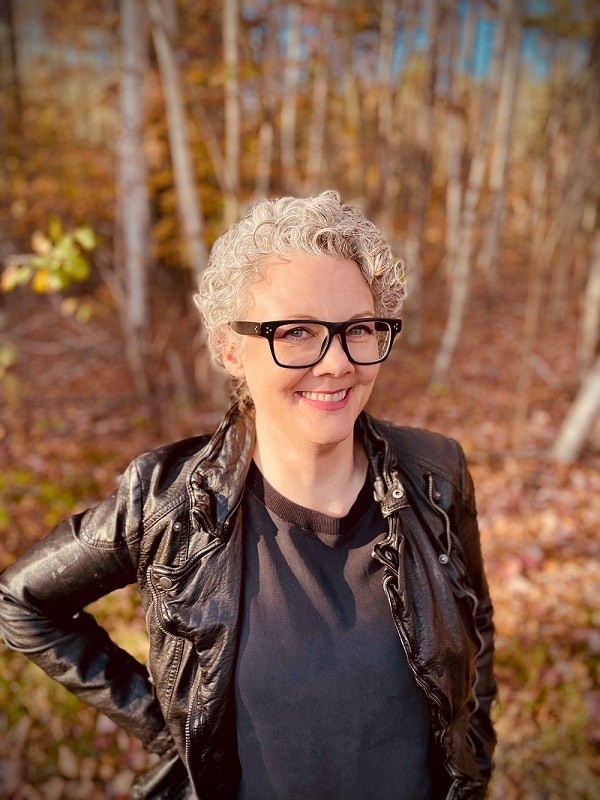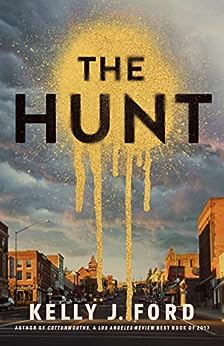
Q&A
Kelly J Ford
Kelly J. Ford is the Anthony-nominated author of REAL BAD THINGS; COTTONMOUTHS, a Los Angeles Review Best Book of 2017; and THE HUNT. Kelly writes crime fiction set in the Ozarks and Arkansas River Valley.
Q. You’ve earned wide critical acclaim for your queer Southern suspense writing. What does this recognition mean to you?
Kelly: Recognition is nice and always a surprise. I’m deeply grateful to Thomas & Mercer for saying yes to my work when so many publishers say no to stories by traditionally marginalized authors. It’s cliche but I’m writing the books I want to see in the world because there just aren’t that many adult novels for queer women out there compared to other audiences. It feels good to know that some readers might be able to see themselves reflected in a narrative. And I’m hopeful that other queer writers will see my work and that of other queer writers and feel inspired or at least motivated to keep going when publishing feels like it hasn’t moved the needle on narratives about our lives.
Q. Why was it important to you to highlight family influences and circumstances that can potentially lead people to become accidental criminals, or to be perceived as such due to bias?
Kelly: I think it’s far more common for people to get caught up in bad situations (either by choice or accident) than for people to be truly evil. So many bad choices I’ve seen from folks are due to economics. And if that’s not passed down through family, I don’t know what is. Generational trauma and circumstance can absolutely affect who you become as an adult. That’s rich, fertile ground for a writer to explore. I like to know how people tick, what circumstances shaped them into who they are and where they ended up. To me, those elements, when explored in fiction, elevate the story as a whole.
Q. Can you share your inspiration for Nell and how you developed her as a character?
Kelly: Nell has been a character wandering around my head for so many years. She’s like an actress waiting for the perfect role, and I think I found it in The Hunt.
There are people who can move past their circumstances but I’m drawn in fiction and in life by complicated, complex people who are blocked by some event in their past. Nell is a perfect example of that. She’s someone who is stuck emotionally and physically due to trauma she experienced as a teen after the shocking death of her brother. Even though she was wandering around my head for so many years, playing various roles in various stories, she had a persistent wound. So it was really a matter of picking that wound apart to see what was really going on with her psychologically and what events led to it. Once I figured that out, I built the story world and plot around it. It’s a different way of plotting, I suppose.
Q. What inspired you to use a plastics factory as your main setting for The Hunt?
Kelly: I worked full time at a plastics factory while going to college full time for a few years. It was truly the perfect job for an English major. I loved working the night shift. Even though I was inside a building and it was loud as hell, the hustle and bustle of the day shift wasn’t there. There’s a kind of solemn yet spooky vibe you feel working when you know most people are settling in for the night and going to bed when you’re just beginning your day. You feel like you’re not even a part of the world. That felt like the perfect tone for The Hunt, which has the whole town questioning whether or not a serial killer is on the loose.
I’ve had a lot of jobs over the years in various industries, from blue collar to white collar. When you spend so much time with people on a regular basis, it’s impossible not to have those people and your shared stories infect your life in some way. We see the same people day in and day out. I see them more than my family and friends. But that’s also why so many of them became and have stayed my friends over the years. When employers call themselves a “family,” I see that as an immediate clue that it’s probably a toxic work environment–but what a perfect setting for a crime novel!
Q. The Hunt uses an innovative way of dropping clues like breadcrumbs with the shared Google Doc. Where did that idea spring from?
Kelly: I pretty much live in Google Docs for my day job, so it felt like a natural medium for these unknown sleuths to collaborate on the victim stories and try to work out what’s going on in town–especially because the book takes place right after the COVID-19 lockdown phase. So many of us had to collaborate in separate locations during that time period. And it also provided a way for me to zoom out from the main characters and show the town at large and to put a human face on the victims.
Q. Is the Hunt in your novel based on a real contest?
Kelly: My hometown radio station used to hold “Hunt for the Golden Egg” (and various other golden items) around Easter every year. I always wanted to go as a kid but never got to. My disappointment mixed with dread when I heard the DJ read the next clue during commercial breaks. He read it in what I thought was a creepy voice, and I loved scary stories–so in my head it translated into something sinister and dark. Though my hometown contests were crime free as far as I remember.
Q. What is your favorite part about writing crime novels set in rural, small towns in the South?
Kelly: I grew up binging romance and true crime books thanks to my grandmas, and horror novels thanks to my parents. I think all those genres blended in my head and come out in my novels as Southern Gothic Crime. “A Rose for Emily” imprinted on me at a young age as well. In my own life and surroundings growing up in Arkansas, there was dilapidation and desire everywhere. And there’s something about a small town or rural setting that applies a pressure cooker-type of tension. The south is haunted for a multitude of reasons. People don’t let go of hurts. They’re often insular and suspicious of others. They want what they don’t have. Or they want to keep others from what they have. Those feelings are dangerous fuel for crime.
Q. What’s next for you? Possible to get a sneak peek?
Kelly: I have a few things pinging around my brain right now, but I’m probably going to settle on another story that’s inspired by something from my hometown. There was a house on the outskirts of town that looked like it glowed at night thanks to the way it sat on the hill and reflected the city lights. And of course, you can’t have a Glowing House without a backstory that includes a family that has all gone mad and now the place is allegedly haunted. It’s still marinating, but no doubt it’ll be queer and there will be a crime.

